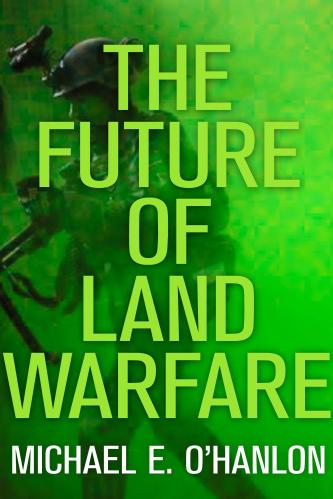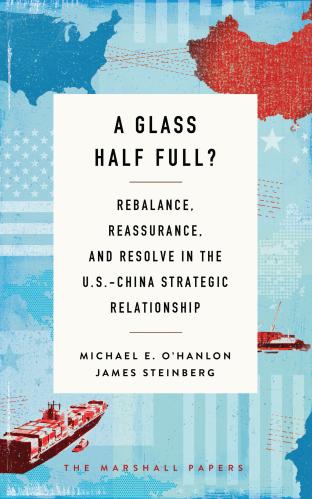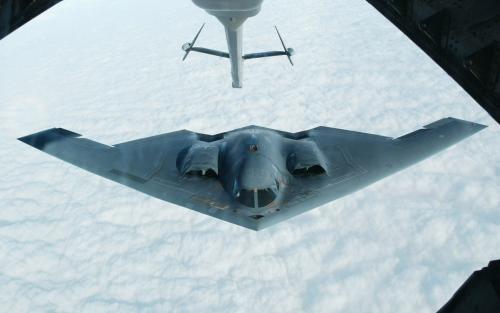The United States today faces a diverse array of threats. While some, like radical extremism, have become more familiar, others like China and Russia require updated thinking and new capabilities. On February 12, Representative Seth Moulton (D-MA) delivered a keynote at the Brookings Institution on House Democrats’ vision for the future of U.S. defense policy, followed by a conversation with Senior Fellow Michael O’Hanlon.
Moulton explained that as a Marine serving in Iraq, he realized that “playing politics with war and foreign policy takes on a whole new meaning when you know some of the people who die as a result.” Moulton said that “we must do everything we can to prevent that from happening again,” which is why sound foreign policy leadership is so important.
Moulton observed that in light of new pressures on U.S. national security, it isn’t enough to return to the time before the Trump administration. He compared the need for a new foreign policy approach to rebuilding, and not merely restoring, a house that gets burned down. Moulton stressed that the United States needs “next-generation thinking,” particularly to develop newer, smarter, stronger arms, alliances, and arms control.
The reemergence of great power competition exposes the limitations of America’s current array of capabilities, he said. Moulton once asked the Chief of Naval Operations how many times the Chinese had attacked an American aircraft carrier—the answer was zero—and then how many times the Chinese had attacked the United States through the Internet, which occurs on a daily basis. Moulton stressed that spending 16 times more money on aircraft carriers than on cyber defense makes no sense given the nature of the daily threats faced by the United States.
Thinking about the ecosystem that produces America’s defense systems, Moulton pointed out that “Russia and China have an inherent advantage over us by being more budget restrained and less politically constrained…They don’t have the luxury of trying to compete with our big expensive legacy weapons systems, so they have to develop the smaller, cheaper, next generation weapons.” Given that asymmetry, Moulton concluded the United States must “dramatically up our investment in autonomous, hypersonic, and cyber weapons.”
Moulton disputed that arms control is limited to reducing weapons. “Done well, arms control also makes us stronger by giving us a strategic advantage.” But Moulton stressed that arms control can’t be limited to traditional weapons—it must include new ones such as artificial intelligence (AI) because “authoritarian regimes have an inherent advantage in developing AI weapons systems.” Moulton believes that “we’d be wise to consider what kinds of arms control over autonomous weapons powered by AI will make us safer.”
Finally, Moulton observed that Trump’s handling of NATO has opened a need “to rethink its strategic role and purpose. Now is the opportunity…to renovate and strengthen it for a new world.” He also suggested reexamining America’s troop commitments to places like Japan and Germany, and also to considering “whether it makes sense to establish a Pacific NATO to counter China.” In the Middle East, while the United States “can’t simply abandon places like Syria without any plan,” Moulton said “we need clear and achievable missions, approved by Congress and transparent to the American people so that our troops can fight for peace and know what they must achieve to come home for good.”
O’Hanlon asked Moulton whether the Iraq war was inherently a mistake, or whether the manner in which the war was conducted was the problem. Moulton responded that the war itself, and the manner in which it was conducted, were both problematic. He said “there are lessons of failure to take from Iraq.” However, he gave credit to key figures such as General David Petraeus and Ambassador Ryan Crocker for “truly leading a successful turnaround of the war” with the surge. Also, there were times during the war when U.S. strategy yielded results—pointing in particular to General H.R. McMaster’s success with Tal Afar.
O’Hanlon then asked whether Moulton supports an initiative to encourage, or obligate, national service. Moulton argued that growing organizations like AmeriCorps would generate even more demand for them, but because the United States has had success with an all-volunteer military, such an initiative should be voluntary. In the end, Moulton believes that whether service takes a civilian or military character, “if more young people had that experience it would make us a better country, a stronger country, a more united country”—and that, subsequently, both military and civilian service would increase.
O’Hanlon then brought up Russia and China, and asked Moulton whether he thinks of them as part of a single big threat complex, or separately from each other. Moulton said that “in terms of timeline, Russia…is a more immediate threat… [while] longer term, China is the problem” because China is developing not only traditional weapons, but also new types of military weapons while seeking to set “the standard and control the way that we all communicate here at home and across the globe.”
On North Korea, O’Hanlon asked Moulton if he believes China is a partner in that problem. Moulton explained that while he doesn’t think China “is in cahoots with North Korea,” no one has laid out a road map for success, and the Trump administration was responsible for the tensions it gave itself credit for ratcheting down.
Finally, on the defense budget, O’Hanlon asked Moulton what kind of a number for the overall defense budget would be appropriate. Moulton responded that “at the end of the day, it really is not about what the top line number is, it’s about … whether [we’re] meeting the challenges of the future.”
Asked during the audience Q&A about reports on his presidential aspirations, Moulton responded that he is indeed looking at running for president. In particular, the next Democratic nominee must “make the argument to the people that there are serious national security concerns across the globe, and that this has got to be part of the debate,” to which he says he believes he has unique contributions to make.
The Brookings Institution is committed to quality, independence, and impact.
We are supported by a diverse array of funders. In line with our values and policies, each Brookings publication represents the sole views of its author(s).






Commentary
Rep. Seth Moulton on geopolitical threats, defense spending, lessons learned, and more
February 21, 2019